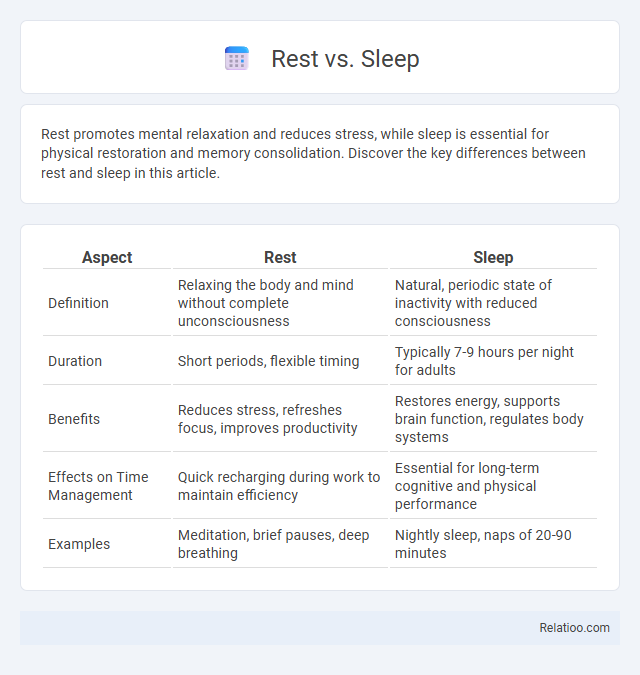Rest promotes mental relaxation and reduces stress, while sleep is essential for physical restoration and memory consolidation. Discover the key differences between rest and sleep in this article.
Table of Comparison
| Aspect | Rest | Sleep |
|---|---|---|
| Definition | Relaxing the body and mind without complete unconsciousness | Natural, periodic state of inactivity with reduced consciousness |
| Duration | Short periods, flexible timing | Typically 7-9 hours per night for adults |
| Benefits | Reduces stress, refreshes focus, improves productivity | Restores energy, supports brain function, regulates body systems |
| Effects on Time Management | Quick recharging during work to maintain efficiency | Essential for long-term cognitive and physical performance |
| Examples | Meditation, brief pauses, deep breathing | Nightly sleep, naps of 20-90 minutes |
Understanding the Difference: Rest vs Sleep
Rest involves a state of relaxation where the body and mind reduce activity without necessarily entering sleep, promoting recovery through decreased stress and muscle tension. Sleep, a deeper and regulated physiological process, facilitates essential functions such as memory consolidation, hormone regulation, and cellular repair during various sleep stages like REM and deep sleep. Understanding the difference between rest and sleep highlights that while rest rejuvenates by calming the nervous system, sleep is critical for comprehensive physical and cognitive restoration.
What is Rest? Definitions and Benefits
Rest is a state of relaxation that allows the body and mind to recover from physical or mental exertion without the need for sleep. It involves activities such as sitting quietly, meditating, or lying down, which help reduce stress, lower heart rate, and improve cognitive function. Benefits of rest include enhanced muscle repair, increased energy levels, and improved mood regulation, making it a crucial component of overall health and well-being.
Sleep Explained: Stages and Importance
Sleep consists of distinct stages, including non-REM (NREM) stages 1-3 and REM sleep, each crucial for physical and cognitive restoration. NREM sleep promotes tissue repair, immune function, and energy conservation, while REM sleep supports memory consolidation and emotional regulation. Understanding these stages highlights the importance of adequate, uninterrupted sleep for overall health and effective rejuvenation beyond mere rest.
Physical Rest vs Mental Rest
Physical rest primarily involves reducing bodily movement and allowing muscles to recover, which is crucial for tissue repair and energy restoration. Mental rest, on the other hand, focuses on calming the mind, reducing cognitive load, and alleviating stress to improve focus and emotional resilience. Effective rejuvenation requires a balance of both physical rest and mental rest to optimize overall health and performance.
How Sleep Impacts Overall Health
Sleep plays a critical role in maintaining overall health by supporting immune function, cognitive performance, and emotional regulation. Quality sleep facilitates cellular repair and hormonal balance, reducing the risk of chronic conditions such as cardiovascular disease, diabetes, and obesity. In contrast to simple rest, sleep enables deeper physiological restoration and memory consolidation essential for physical and mental well-being.
The Science Behind Rest and Recovery
The science behind rest and recovery reveals that rest allows your body to conserve energy and repair minor tissue damage, while sleep triggers essential processes like memory consolidation and hormonal balance crucial for physical and mental health. Rejuvenation involves more than just the absence of activity; it is the active restoration of cellular function and immune defense, facilitated by deep sleep cycles and relaxation techniques. Prioritizing adequate rest and quality sleep maximizes your body's ability to recover efficiently and maintain overall wellness.
Signs You Need More Rest versus More Sleep
Recognizing signs you need more rest versus more sleep hinges on understanding your body's signals; fatigue paired with irritability and decreased focus often indicates a need for rest, while persistent drowsiness, heavy eyelids, and slow reaction times signal insufficient sleep. Rest rejuvenates the mind through relaxation and reduced mental exertion without necessarily requiring sleep, whereas sleep restores physical health by cycling through REM and deep sleep stages essential for memory consolidation and cellular repair. Monitoring these symptoms helps optimize personal health strategies to balance restful breaks and quality sleep, enhancing overall rejuvenation and well-being.
Tips for Improving Sleep Quality
Improving your sleep quality involves creating a consistent bedtime routine, ensuring your sleep environment is dark, cool, and quiet, and limiting exposure to screens at least an hour before bedtime to reduce blue light interference with melatonin production. Incorporating relaxation techniques such as deep breathing or meditation can help calm your mind, promoting deeper restorative sleep crucial for physical and mental rejuvenation. Avoiding caffeine and heavy meals close to bedtime further supports uninterrupted sleep cycles, allowing your body to rest effectively and recharge.
Effective Ways to Incorporate Rest Into Your Day
Incorporating effective rest into your day involves prioritizing short breaks, practicing deep breathing techniques, and creating a calm environment that promotes relaxation. Quality sleep, distinct from rest, supports cognitive function and physical health, while rejuvenation combines both to restore energy and mental clarity. Ensuring consistent periods of rest enhances productivity, reduces stress, and supports overall well-being.
Rest and Sleep: Achieving a Healthy Balance
Rest and sleep serve distinct but complementary roles in maintaining optimal health, with rest involving periods of low physical and mental activity to reduce fatigue, while sleep facilitates critical physiological processes like memory consolidation and cellular repair. Achieving a healthy balance requires recognizing that rest can occur intermittently throughout the day, providing short-term recovery, whereas sleep, typically spanning 7-9 hours nightly for adults, delivers deep restorative functions essential for cognitive performance and immune function. Emphasizing both adequate rest and quality sleep aligns with improved mood regulation, enhanced energy levels, and long-term wellness.

Infographic: Rest vs Sleep
 relatioo.com
relatioo.com